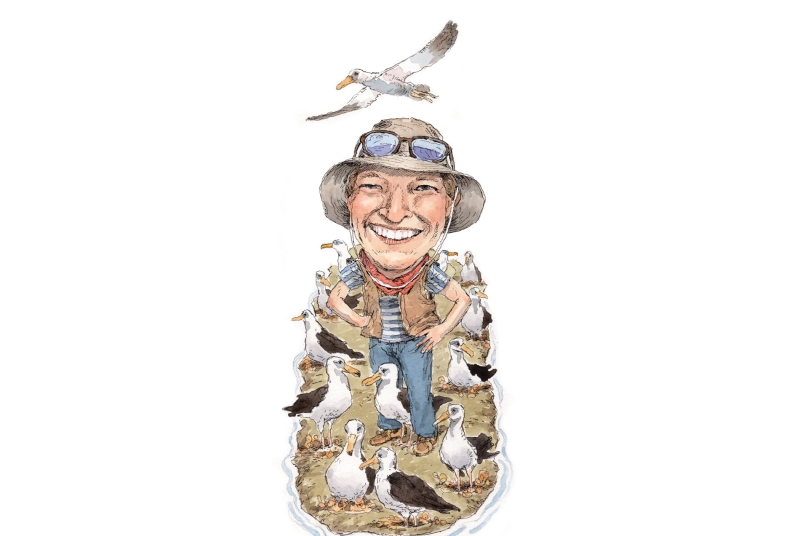
Caroline Pott ’02
Notable: An employee of the U.S. Fish and Wildlife Service since October 2023, Pott is deputy manager of its 2.3-square-mile refuge on Midway Atoll. She is one of fewer than 50 residents among millions of seabirds, including an estimated 1.5 million albatrosses. Her job includes restoring the tiny atoll to its natural state, which was compromised by the U.S. Navy facility in operation there from 1941-1993.
Career: Previously worked for an integrated development foundation in Thailand, conducted desert research in Arizona and Africa, held a desk job for a nonprofit fighting illegal international wildlife-related trade, and has engaged in protected area management since 2011: in Gabon for the Wildlife Conservation Society, and in the U.S. Virgin Islands for the territorial government.
Education: A.B., ecology and environmental biology, 2002; MSc, Oxford University, 2006
“I caught wanderlust from my parents. Seeing beautiful landscapes, I wanted to protect both the land and its animals. I also grew up with chickens. Watching them interact, which was like watching a soap opera, was fascinating to me. Both experiences contributed to my interest in the natural world.”
“In my first job in Thailand, I didn’t know what I was getting into, but land conservation has been an undercurrent of my career since Dartmouth, where I was born as a biologist and felt very rooted in the forests of New Hampshire.”
“Midway Atoll is very remote on a map, but in terms of accessibility, it isn’t. We have flights that come every two weeks, so I can order something in the mail, and it will be here soon. I’m not wanting for anything. I even have a dishwasher for the first time in my adult life.”
“There are seven to 10 fish, wildlife, and biology staff here, and about 40 skilled people who help us run this place: water treatment guys, electricians, a good mix of folks. We also have various researchers who come to visit, so it’s not the same people all the time. There’s a good library here. Puzzles are popular; so is trivia. Karaoke is really big.”
“I could stay here for 20 years. Most people stay three to five. It’s a tough place, because you have to cut yourself off from a lot of things you enjoy, and having your family visit isn’t possible.”
“I wanted to do land- and protected area-management partly because it uses my hands and my brain. Every day is different.”
“I meet regularly with representatives of the Federal Aviation Administration (FAA), which helps us support the airport here. Because the airport is an emergency landing point for commercial flights, the FAA pays us a lot of money to administer it and underwrites our infrastructure to do so. Thankfully, there hasn’t been an emergency landing here since 2021.”
“All in one week I conducted a self-taught necropsy on a dolphin, snorkeled with a visiting scientist who was looking for samples of an algae that overgrows corals, and observed the banding of a short-tailed albatross. We have the only nesting pair in the United States.”
“The sound of albatrosses is a constant here. They come in October, lay their eggs, and sit on them until about January. In addition to chicks and adult albatrosses who come in to feed them, there’s also a teenage crowd acting like they’re at a high school dance. Despite the large population, there isn’t a bad bird-poop smell, but when chicks die in large numbers in July, there is a noticeable stench.”










